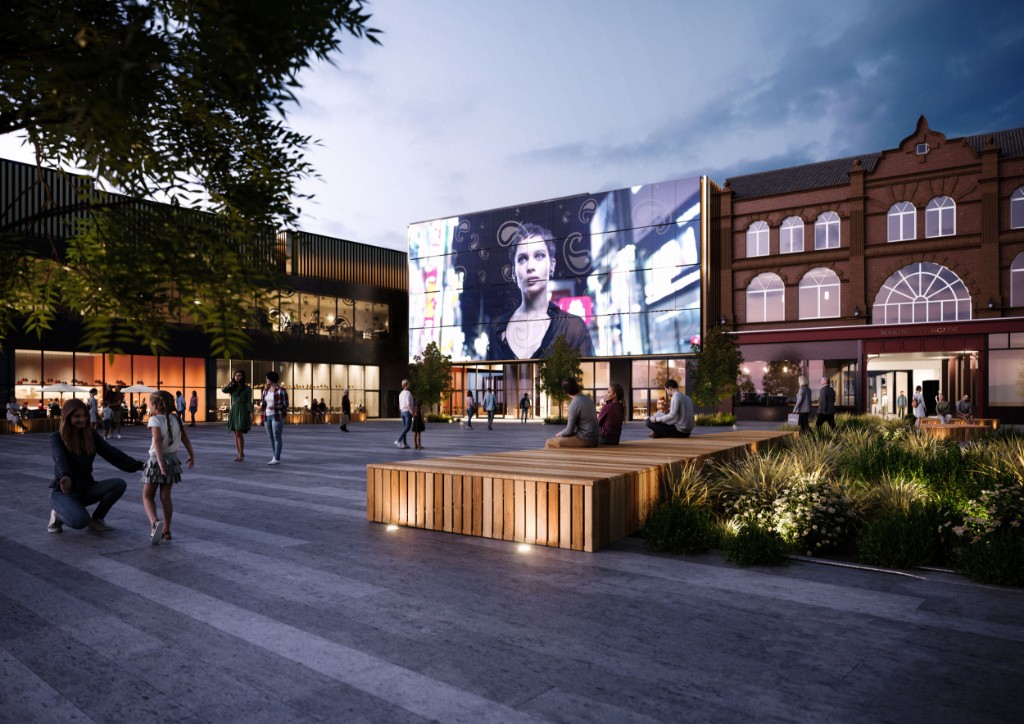Very short + to the point update. This will be my last blog pre-summer break, and a great way to go into the summer recess (though there are events throughout). Another cracking in-person event, this week in Manchester at the fabulous The Lowry Hotel – in (yes, really) the Manchester sunshine! These face to faces are great, not just for business but our mental health – to socialise, meet new people, see friends, eat bacon butties. Apologies for focusing on the Wirral/Birkenhead parts – I am unashamedly, utterly and completely pro-Birkenhead (that’s where I live) – so particularly interested in Alan Evans updates.
The first speaker set the scene well for the morning’s debate, discussion + other panel speakers. Emma Birkett, heritage director, Rochdale Development Agency. Conservation + regeneration themed, heritage led regeneration (great to see this isn’t an issue specific to only Liverpool). Blessed with historic buildings, Oldham has successfully repurposed its town centre with heritage led regeneration. When demolition is simply not an option. Mixed results, it has worked but need to use data and learn (and share). Heritage assets often seen as a barrier to development, other highlights raised: demand review of planning laws, earlier engagement with experts + those with the right knowledge + experience. Example used of projects that simply wouldn’t be do-able (or of interest) to private sector developers in isolation, needs a PPP partnership. Funding is key, along with the business case – weakest area of regeneration and conservation (especially for PPP). Bespoke social value strategy, not national generic approach.
Panel ONE, with Emma Birkett: Phil Mayall, board director, Muse Developments. Kevin Riley, director, WSP. Barry Roberts, managing director – North West, Morgan Sindall Construction. Roger Frith, head of strategic regeneration & development, Oldham Council.
Phil Mayall: Conservation can add value its not a case of either or. Time, policy, desire needed – history adds value and must be acknowledged, considered + embraced. Community pride is also an important factor. Need brave LA’s. Town centres: Specific purpose and relevance to area – look inwards first before looking out. Not simply saying we want the same as Rochdale or the same as Manchester. This will lead to failure, as is evident with town centres right now. Focus on self/specific area not others. PPP is incredibly complex to achieve, so many factors why: technical, cost, social, uses, multiple sectors, multiple stakeholders to satisfy.
It was great to hear Barry Roberts discuss projects across the region, and even better that they were projects Project Four are involved with – Knowledge Quarter (Liverpool) and Hammerstone Road (Manchester).
Mark McNamee Cityheart: a new arrival to regeneration business. Successful developer for Wigan’s, The Galleries (CGI below). Public sector authorities look at companies not people (we echo and support that). Mark highlighted the obscure requirements/criteria, often sought after by public sector bodies – that mean the LA’s don’t always end up with the best fit / right developer. What is needed: an intelligent timeline, a Borough wide skills strategy, linked up thinking, not just centre. The Galleries – asset seen as a barrier to growth, diverse requirements, REPURPOSING (term used many times through the session today). Get people back into Wigan (opening up the place). Towns are the new cities? Leisure will drive this scheme. Lots of F+B a mix of local and national partners. Contributing factors for a successful PPP: Council champion, council drivers, political buy in, team ethos, understanding public sector.

Panel TWO, with Mark McNamee: Richard Laming, senior director, Turley. Darren Jones, development director, Nikal. Alan Evans, director of regeneration & place, Wirral Council.
Alan Evans: Experience is critical. Ingredients for PPP: framework, give developers confidence, design code, strategic plan, will drive quality. Two significant developments (1) Wirral Growth /Town Centre (and several other sites on Wirral) + (2) Peel, both very different. Birkenhead Town Centre has been in decline for 20-30 years, footprint too big, weak planning framework, infrastructure needed / council works needed to achieve desired outcomes, procurement is painful for both sides. Peel’s Wirral Waters – the LA has less control but been in making for a long time – co-produced council + Peel with other partners, such as LJMU, Mersey Maritime to create educational and skills drive, but a very different model to town centre. Time and expensive procurement as highlighted by other sneakers. See more: https://wirralgrowthcompany.co.uk
Competitive dialogue / procurement process (Mark) could spend 500k to 1million and not be successful. Room for improvement, procurement. Scoring. Pagabo framework (https://www.pagabo.co.uk/) is being looked more favourably because of this, we would say speak to our friends at Procure North West, Robbie Blackhurst.
Refreshing to hear Alan acknowledge the failure of Wirral in recent years to act as an extension to Liverpool, something that has always aggrieved me.
Based on the recent events attended by me personally and my co-Director Max Meadows – we have concluded, and this won’t come as a surprise, that Planning and Procurement are the biggest restrictors to development right now, shortly followed by the ‘supply + demand’ for materials.
Enjoy the Summer and England’s Euro Campaign.